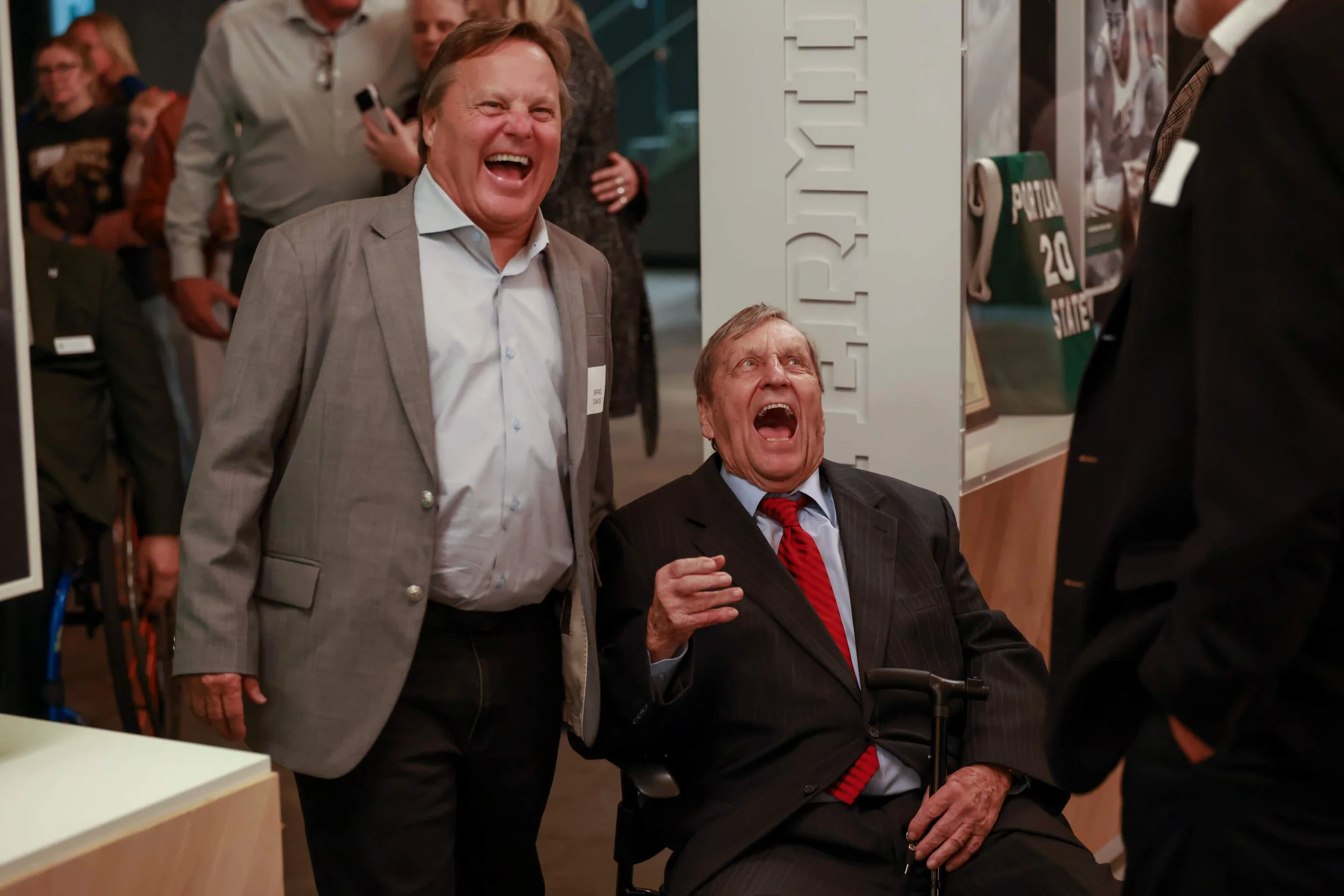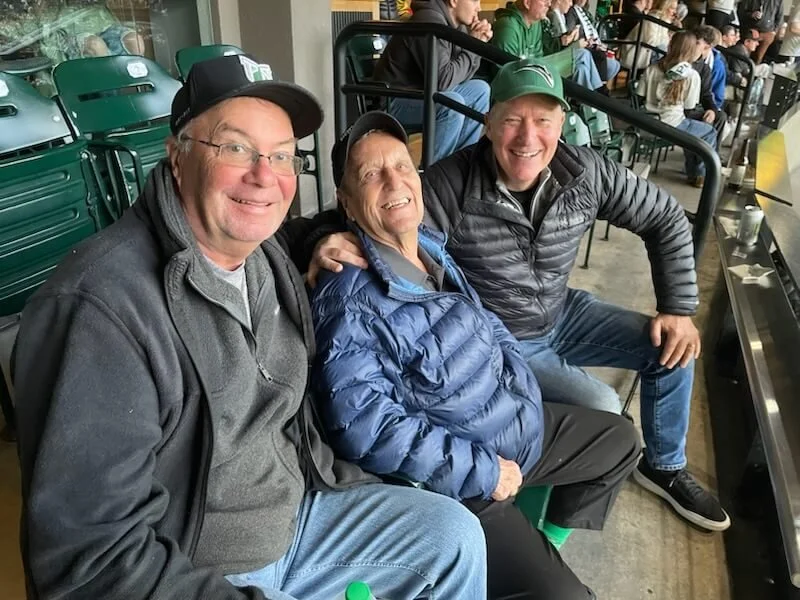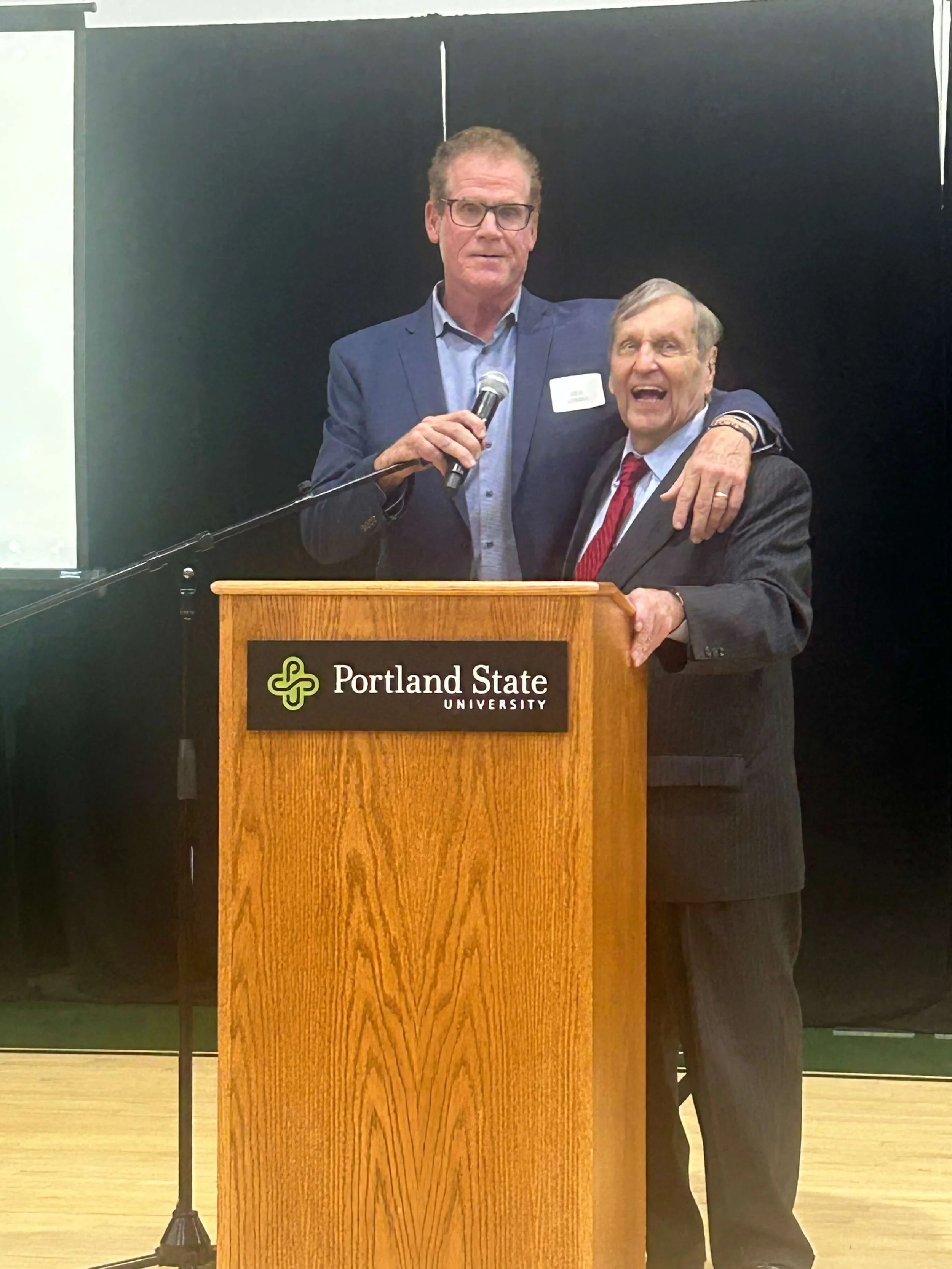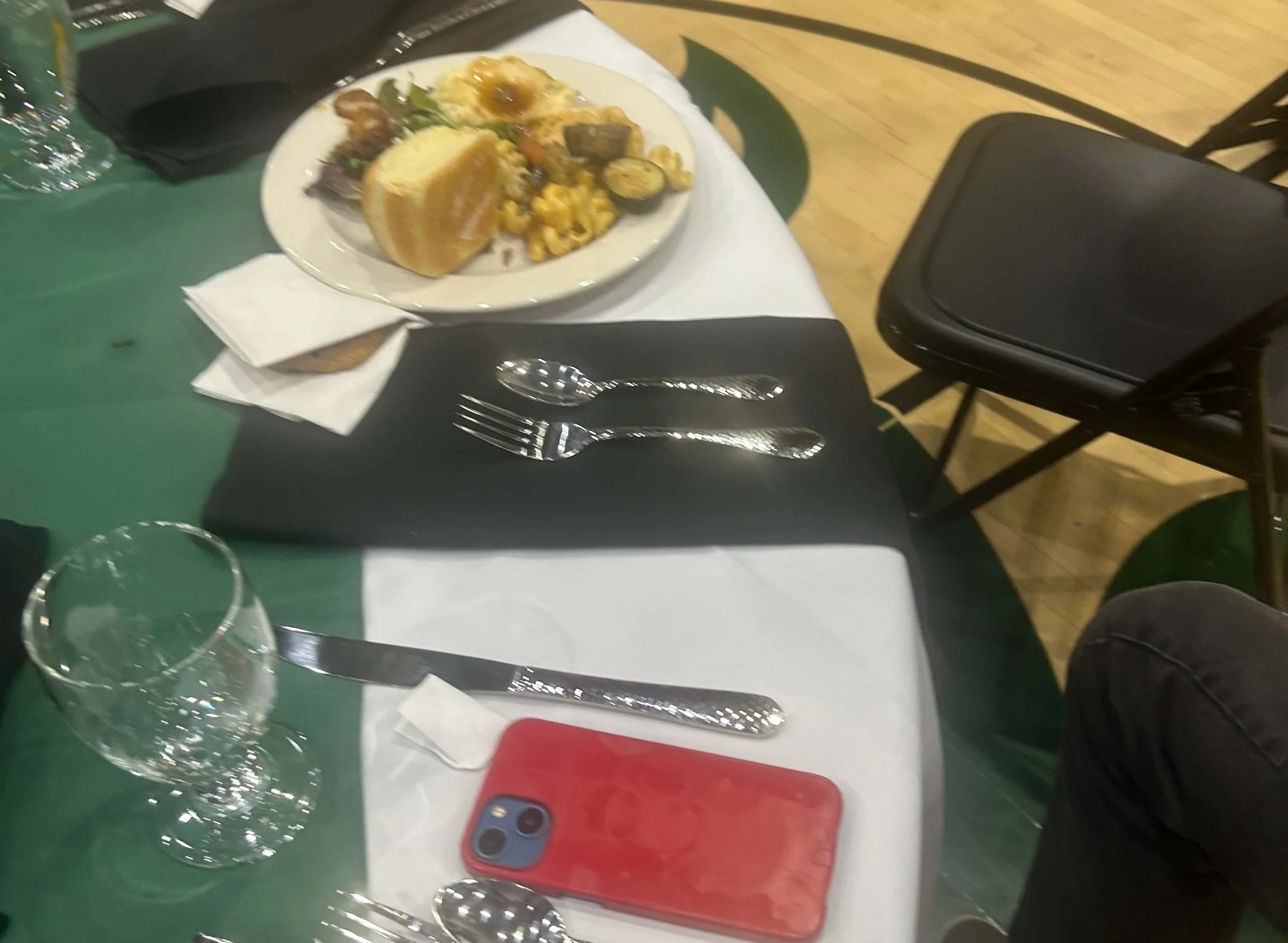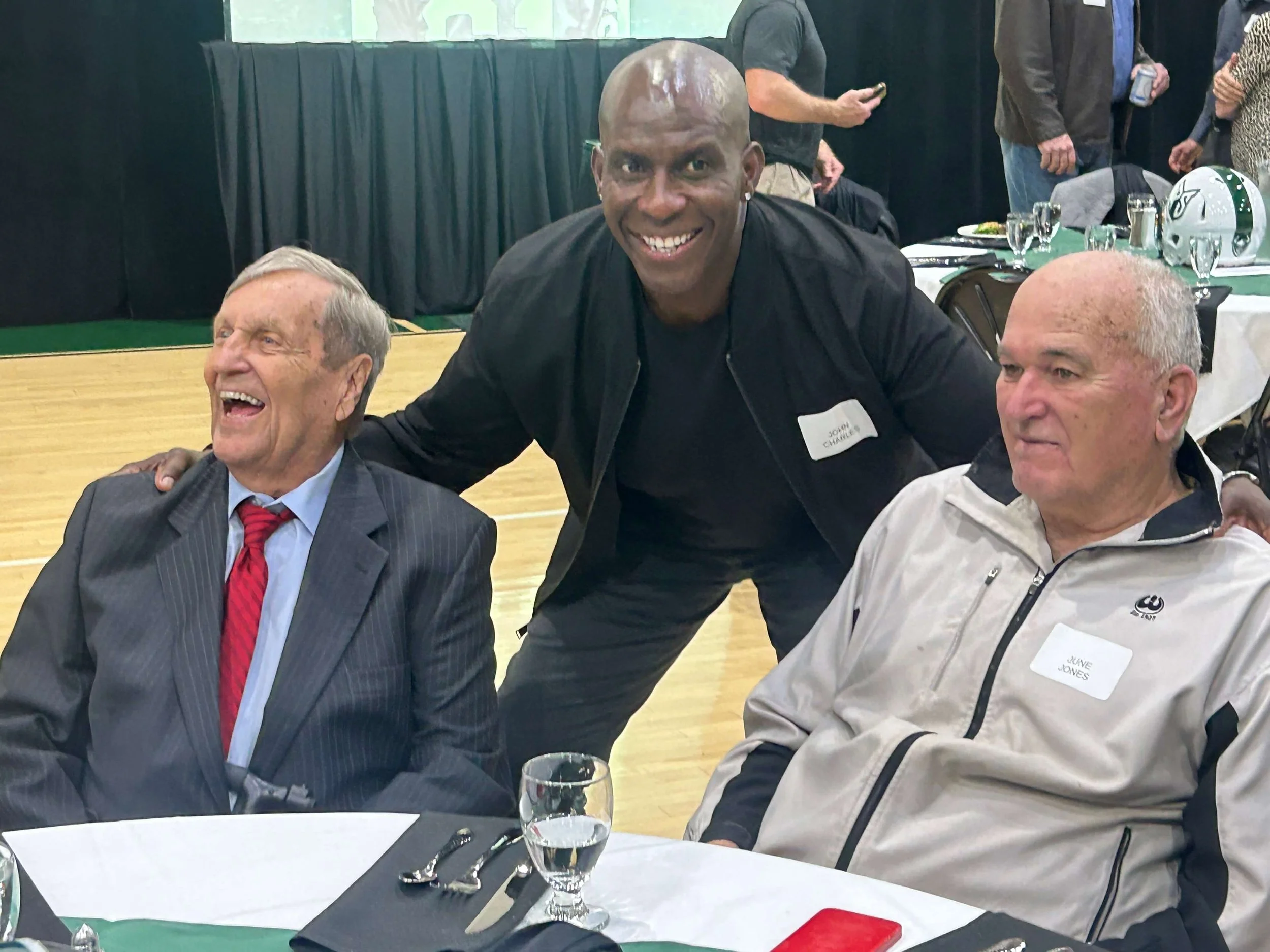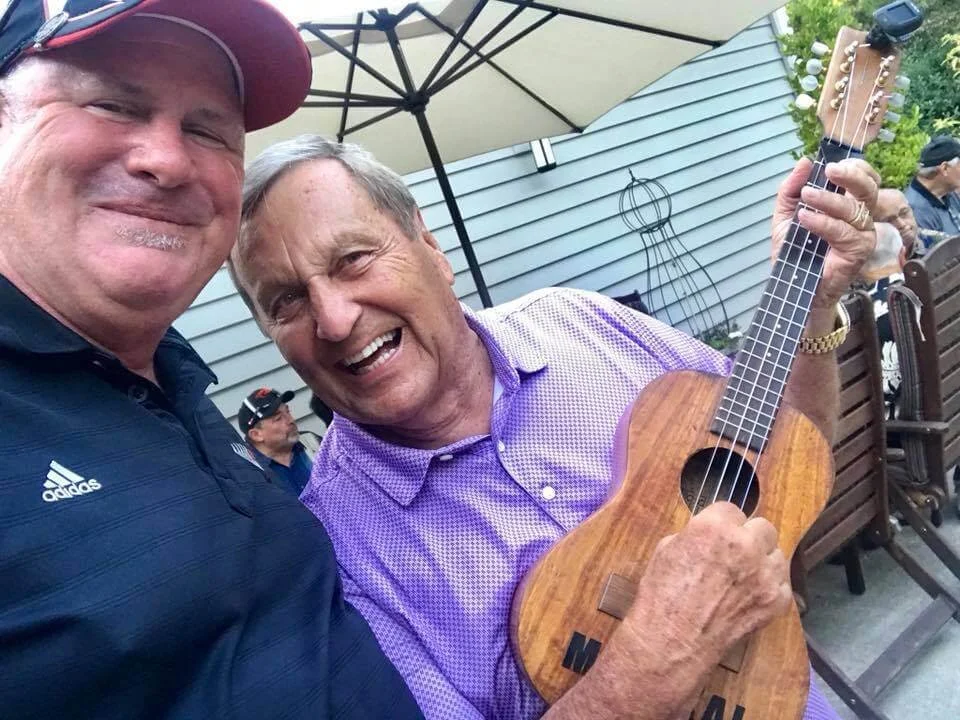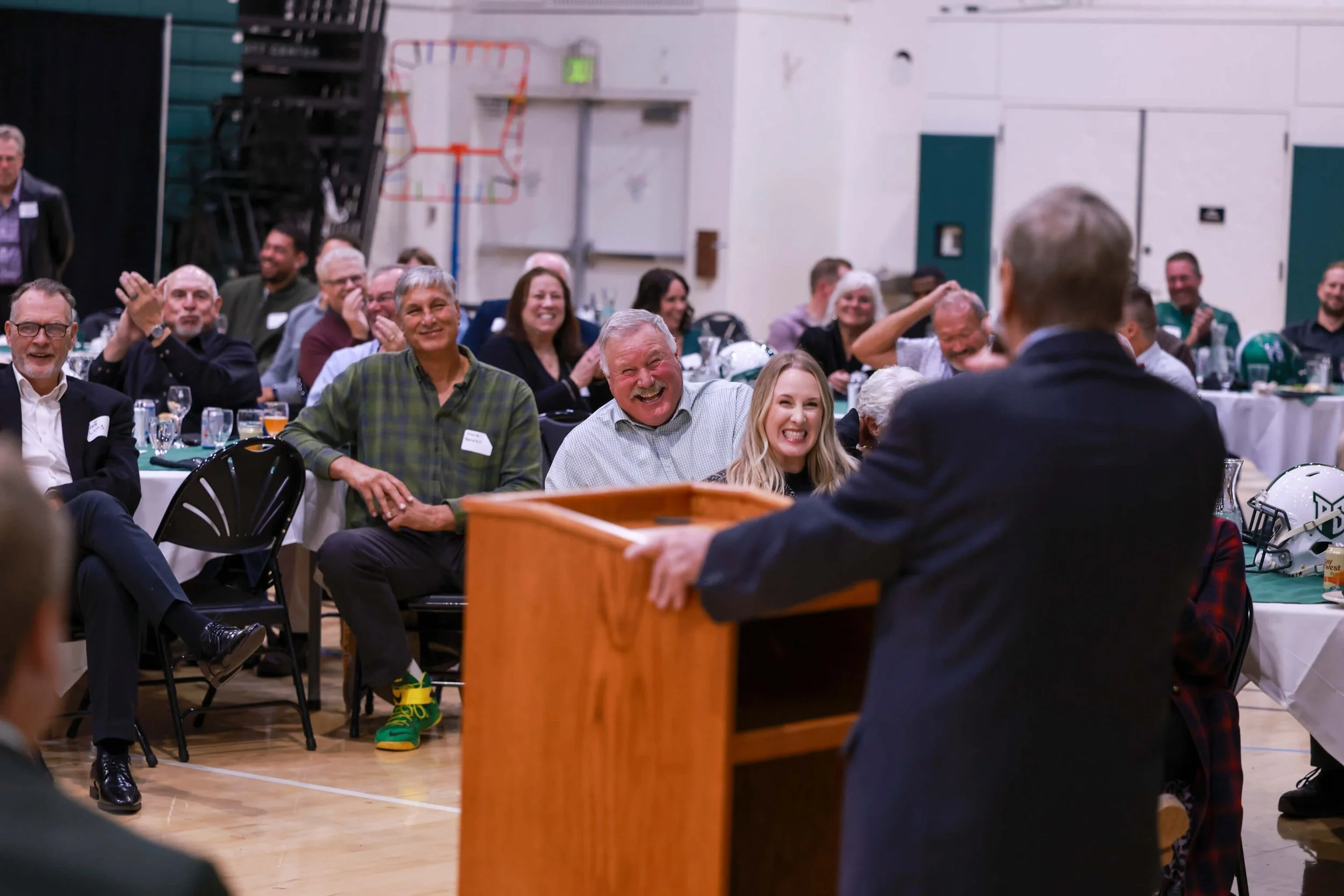Mouse’s men gather to pay tribute to their coach, mentor and friend
Mouse Davis (right) and son Brad laugh it up during Mouse’s big night at the Portland State Pavilion (courtesy Jack Lewy)
In stature, Mouse Davis was among the smallest men in the room Friday night at the Portland State Pavilion.
No matter. His presence was largest of them all.
It was a weekend dedicated to Davis and his legacy as football coach — also mentor and life-long friend —at Portland State.
Nearly 100 of those who played for and coached with Davis during his celebrated tenure as head coach of the Vikings from 1975-80 were in attendance for Friday’s dinner event, during which Erik Edmonds, the school’s associate athletic director/development, announced establishment of endowment for a football scholarship in Mouse’s name and a display in his honor in the Hall of Fame lounge at the Pavilion.
Dozens also were on hand for a celebration of Davis’ PSU career at halftime of the Vikings’ loss to No. 2-ranked Montana Saturday afternoon at Providence Park, gathering beforehand for story swapping and renewed brotherhood at the Kingston and Bullpen sports bars near the stadium.
“The huge crowd of people shows the love and respect Mouse’s players had for him, and continue to have for him,” says Phil Hopkins, an outside linebacker during his playing days in the late ‘70s.
Davis (center) with former players John Heiser (left) and Phil Hopkins (courtesy Phil Hopkins)
Davis, now 93 and living with son Brad in Houston, coached only nine years at PSU, including three as an assistant. His impact, though, was immense. That’s why Edmonds, new to his position at PSU, and those in the athletic department chose to honor him.
“As I was meeting with donors to the athletic program, there was a central theme amongst a lot of guys who played for Mouse,” he says. “They were interested in supporting the program, but wanting to do something to honor him. That sparked the idea (of the endowment and Hall of Fame display). Many folks have stepped up to support this project.”
Many folks, also, wanted to have the chance to see Mouse again in person, to shake hands with him, hug him and tell him how much they think of him.
“I love Mouse, just like all of the guys do,” says Neil Lomax, the poster guy and All-America quarterback during Davis’ run at Portland State. “My dad was great, but he didn’t get sports. Mouse was a father figure for me. He made sure I made the right decisions and was around the right people every step of the way.”
Mouse with his greatest quarterback and partner in crime, Neil Lomax
Brad and Mouse flew into Portland on Thursday. That night, there was a get-together of players from his Hillsboro High team that won the 1973 3A state championship, beating Fred Spiegelberg’s Medford Black Tornado 35-21 in the title game. Friday night was the PSU reunion, attended by friends and a large group of family members that included Mouse’s daughter, Debbie Davis.
I don’t believe Mouse was able to eat a bite of his dinner. He was too busy greeting friends who came by the head table with a firm handshake and his trademark smile. Time has slowed down the man who once could talk and crack wise as ably as he coached football, but he still has the warm demeanor and laugh that has helped make him such a popular figure with those who know him.
Davis’ meal went untouched Friday night — too many well-wishers stopped by his table to pay their respects
Following dinner, player after player stood in front of the crowd and paid tribute to the man of the hour. When it was Mouse’s turn, Lomax helped him walk to the podium. Mouse didn’t have a lot to say, but his wit remains.
“I look around this room, and there are some real uglies here,” he cracked ahead of a cackle. As he walked back to his table, he was greeted with a long standing ovation. As he sunk into his chair, he saw me sitting at his table, winked, and said, ‘You didn’t think I was going to make it, did you?’ ”
Oh yes I did, Mouse. I knew you would.
I became aware of Davis when he coached at Sunset High in 1970. I was a member of the No. 2-ranked Corvallis High team that knocked off Mouse’s top-ranked Apollos 42-12 in the quarterfinals on the way to the state title.
Eight years later, I was a young reporter at the Oregon Journal assigned to cover PSU football. Davis had made the Vikings special with his “run-and-shoot” offense that cranked up volumes of passing yardage and lit up scoreboards. Basically, the offense regarded the run as a necessary evil. It featured double wideouts and slotbacks with no tight ends. Pass patterns were primarily based on reading the defense’s coverage. When it worked, it was electric.
During the offseason in early 1978, I asked Mouse about doing a participatory journalism story with his team, and he offered a chance to spend a week working out with the Vikings in spring ball. I was 24 and only a couple of years out of college, so I figured I could handle it physically.
After the week working out with the Vikings, my body had taken a pounding. But Mouse was great, and so were the players — several of whom approached me Friday night and told me they remember the two-part series I wrote about it (It is re-printed in my latest book, “Scrolls of a Sports Scribe,” available only on kerryeggers.com).
Through the years, I remained friendly with Mouse, just like hundreds and perhaps thousands of others. We had an occasional lunch together, played golf a few times, and he participated in my annual charity golf tournament several times. He loved to give me the business. If there was nothing major to razz me about, he would find something. It was all in good fun, delivered with a back pat and that hearty cackle.
The Davis era at Portland State is legendary. He brought the program national notoriety by popularizing and perfecting the pass-first offense developed by Tiger Ellison. Through nearly 80 years of the program’s existence, Davis’ success was eclipsed only by Pokey Allen, who went 63-26-2 from 1986-92.
Davis had five winning seasons in six years as head coach — he also served the 1974 season as offensive coordinator under Ron Stratten and filled the same role in 2007 and ’08 for Jerry Glanville. Mouse’s cumulative record was 42-24 in a period when the Vikings played an independent schedule and didn’t have to play any “money games.” The Vikings competed in Division II from 1975-77 and at the Division I-AA level from 1978-80.
During that span, Mouse went 31-4 in games at Civic Stadium. They led the nation all six seasons in passing offense and the last three in scoring offense. In 1980, Lomax’s senior year, they averaged 49.2 points per game, including embarrassingly one-sided routs of Cal Poly (93-7) and Delaware State (105-0), the former still a Division I-AA record. That season, the Viks threw a then-national record 54.5 times per game, averaging 434.9 yards passing and 504.3 yards total offense.
During his career, Lomax threw for 13,220 yards and 106 touchdowns. He had 28 300-yard passing and 10 400-yard passing games. As a senior in 1980, he passed for 4,157 yards and 37 TDs, with 10 300-yard performances in 11 games.
Davis left at that point for the offensive coordinator job at California, beginning a peripatetic career that ended with a two-year stint as receivers coach at Hawaii in 2009 and ’10. Through 52 years of coaching, he served stints at the high school and college levels along with the NFL, USFL, CFL, World League and Arena League.
In 2007, I wrote an article for the Portland Tribune on Mouse’s 75th birthday.
“It is difficult to say that when you turn three-quarters of a century old, you are not an old fart,” Davis said then. “But age truly is just a number. I have seen people who are 65 who are, you know, 95. And I have seen some 65 who are 45.
I still feel young. But sometimes I think, ‘Jesus, I’m turning 75. What do you think about that?’ ”
For the article, I spoke to some of the greats he coached during his time in the pros, including Hall of Famers Barry Sanders and Jim Kelly.
“I can’t believe Mouse is that old,” said Sanders, the great running back who played his first two seasons in Detroit with Davis as his O-coordinator. “But he is one of those guys who will probably never get old – or act that way.”
Kelly became famous for his 11-year run with Buffalo, leading the Bills to four Super Bowl appearances. But he began his pro career with two seasons with the USFL Houston Gamblers — the first, 1984, with Davis as O-coordinator. The Gamblers went 13-5, racking up a league-high 75 touchdowns. Kelly threw for a remarkable 5,219 yards and 44 TD’s and was named his league’s MVP.
“I could sit here for an hour and tell you all the great things I learned from Mouse Davis and how much fun it was for me,” Kelly told me. “It was a blast. Any quarterback would lick their chops to play in his offense, when you have a coach like that to teach you stuff like that. I tell everybody, that’s where I learned the passing game.”
With the Gamblers, Davis had his quarterbacks roll out on every play.
“Mouse helped me throw on the run and showed me the right way to do it, the technique, the footwork,” Kelly said. “I never was really fast, but I learned how to move in the pocket, to step up and shuffle right and left to avoid the rush.
“I owe so much to Mouse Davis. To be honest, I wouldn’t have been the NFL quarterback I was if not for Mouse.”
In their one year together, Davis and Kelly grew close.
“Mouse was almost like a father – a father and a brother, really,” Kelly says. “He knew how to communicate as a brother does, and I should know, because I have five of them. When you needed somebody to talk to, he was there. He was a practical joker and as down-to-earth as you get. You wish everybody would have a quarterback coach with the personality of Mouse – very caring, very loving.
“But oh, when he was pissed, you knew it. The good thing was, he would always keep it in perspective. One thing I learned from Mouse: It’s not what you say to somebody, it’s how you say it.”
Davis’ first shot at the NFL came in 1998 when the Lions hired him as a consultant. The next year, new coach Wayne Fontes moved Davis into the offensive coordinator job. Detroit improved only from 4-12 in ’88 to 7-9 in ‘89 and 6-10 in ‘90, but had much more punch offensively. One of their quarterbacks, Rodney Peete, gives Davis and his receiver coach in Detroit – June Jones, who played QB for Mouse at PSU – much of the credit.
“Mouse and June were instrumental in my development,” said Peete, who played 15 NFL seasons, his first five as a starter with Detroit. “Mouse is a teacher who understands the game of football as well as anybody in the business. He was as fierce a competitor as any coach I was ever around. That’s the No. 1 thing that stands out. He believed his offense could work anywhere, given the tools and the right situation, and he was committed to winning.
“His thing was, it didn’t matter how big or strong you were, if you executed, you could score points on anybody. If he could put 70 points on you, he would. He always went for the jugular. Every possession, every play was designed to have an opportunity to score a touchdown. That’s what I loved about him.”
In 1989, Detroit drafted Heisman Trophy winner Sanders out of Oklahoma State. The run-and-shoot is not supposed to be a good offense for running backs, but the 5-8 Sanders proved that wrong, rushing for 1,480 yards and 14 TDs as a rookie, then going for 1,304 yards and 13 scores the next season.
“Put Barry Sanders in any kind of offense, he’s going to be pretty good,” Davis said at the time. “But we opened up great lanes for Barry to run in. The run-and-shoot spreads defenders all over the field, and it creates some gigantic holes. If you have a little niftiness like Barry, (the holes) double.”
Sanders, who hasn’t given many interviews since retiring as a player in 1998, was more than willing to tell me about his time with Davis.
“Mouse was tough, a no-nonsense coach – that’s what I remember,” Sanders says. “He was a real go-getter. I was so focused on just trying to prove I could play in the NFL, it didn’t matter what offense I was in, but I liked the run-and-shoot. It was an adjustment not having a tight end, but we did pretty well.
“I had a lot of respect for Mouse and June Jones, but especially for Mouse, since he was the offensive coordinator. He had a real command of the offense, and he was definitely a coach who demands respect. He went about his business seriously, but he liked to laugh and have a good time. He wasn’t one of those uptight type of coaches.”
Mouse Davis with two Viking quarterback greats — John Charles (center), who played for Pokey Allen, and June Jones, who played for Davis
After three years in the World League and CFL, Davis joined Jones as O-coordinator in Atlanta, where June had become head coach of the Falcons. Mouse helped Jones run the offense and coached the quarterbacks,. The starter was Jeff George, who had the two most productive seasons of his 12-year NFL career with the Falcons in ‘94 and ‘95, Mouse’s two years there. George threw for 3,734 yards and 23 touchdowns in 1994, then bettered it with 4,143 yards and 24 TDs in 1995.
“Mouse and June were two of the best coaches I played for,” said George, who retired after the 2001 NFL campaign. “Mouse was the kind of guy who was not only your coach, but your friend. He just made it fun to come in to work every day. You can’t say that about a lot of coaches.
“I wish I’d had more years with him. He was the type of coach you want to finish your career with. Those two years were probably the most fun of my pro career. It was like watching (video) and practicing with my dad – that’s what Mouse was like to me.”
► ◄
As you can imagine, the men who played for or coached or worked with Davis at Portland State feel much the same way.
Portland State was the third stop as a collegian for June Jones III, the former Grant High quarterback who began his college career with two years each at Oregon and Hawaii.
“Mouse somehow got me another two years of eligibility,” Jones says. “I was like the first college player to play six years.”
In his two seasons quarterbacking the run-and-shoot with the Vikings, Jones threw for 5,798 yards and 41 touchdowns. Undrafted, he went on to played five years in the NFL and one in Canada, then coached for 40 years, retiring after the 2023 season. Jones was head coach of the Falcons and Chargers and had a great eight-year run as head coach at Hawaii.
Jones recalls the memorable game his senior year at Civic Stadium against Montana, then the No. 2-ranked Division II in the country.
“I think I had thrown five interceptions,” Jones says. “We were ahead with about 2 1/2 minutes left in the game, but Montana had the ball at about its own 40. On our sidelines, Mouse went to (defensive coordinator) Lynn Hewitt and told him, ‘Let (the Grizzlies) score.’ Mouse wanted to give us enough time to score again, but they weren’t even at midfield, and Lynn was pissed. As they were arguing about it, (the Grizzlies) ran 60 yards for a touchdown. We didn’t have to let them score.”
The touchdown pushed Montana ahead 49-44. With enough time on the clock, the Vikings drove the length of the field, Jones finding receiver Dave Stief in the end zone for the deciding touchdown in a 50-49 victory.
Lomax was a senior at Lake Oswego High who sat in the stands amongst the crowd of 16,395 to watch Portland State’s upset victory.
“That game put Portland State on the map,” Lomax says. “After watching that, I thought, ‘If I ever get a chance to play there in that offense, I’m doing it.’ ”
The irony was, Lomax quarterbacked a run-based offense at Lake Oswego.
“We threw four or five times a game,” he says. “Mouse came to watch me throw in warmups, though, and he left before the game started. He said he saw something in me.”
Lomax started training camp the next summer as the Vikings’ fifth-string quarterback, but won the starting job midway through the freshman season of his record-breaking career. Lomax went on to an eight-year career with the Cardinals — seven in St. Louis and one in Phoenix, making two Pro Bowl appearances.
Says Lomax: “Mouse said, ‘We are going to frickin’ throw it. We are going to be innovative. We are going to spread (opposing defenses) out from sideline to sideline. We are going to make football fun.’ What we did brought notoriety to Portland State. It got Mouse a new job; it got me to the pros. No way I would have gotten the opportunity if it weren’t for Mouse and that style of offense.”
Davis, playing Rick Schonely’s ukulele during an Eggs’ Scramble golf tournament (courtesy Rick Schonely)
Larry Sellers goes back a little further with Davis, to Mouse’s first game as PSU’s head coach, a 35-34 loss at Montana State.
“(The Bobcats) threw a last-minute touchdown pass to beat us,” says Sellers, sports information director at the school from 1968-99. “It was a heart-breaking loss, but after the game, Mouse was going around outside the team bus, talking to not just players but their family members, trying to make them feel better. That’s the kind of guy he is — always thinking of other people.
“He is the friendliest guy in the world to everybody. He has friends all over the place. Maybe an enemy or two, too, because he would never take a knee or run out a clock. His thing was a passing game from start to finish.”
For most of Davis’ time at Portland State, Hewitt was his only full-time assistant.
“The rest of the coaches weren’t fully funded, a lot of them ex-Vikings who wanted to help out the program,” says Sellers, now retired and living in Banks. “Mouse handled the team’s road itinerary, too — hotels, meals and everything, which is pretty amazing for a head football coach.”
Kevin Doherty spent a season coaching the defensive line for Davis at PSU. He had played wide receiver for Ara Parseghian at Notre Dame.
“They were the two most organized coaches on the field I have been around,” Doherty says. “That’s why they were so good. At Portland State, you didn’t have to run laps after practice; you were running the whole practice. You were going from station to station. It was ‘go, go, go.’ I really appreciated Mouse as a coach.”
Few knew Davis as well as Jones, who coached with him at five stops over nine seasons in college and the pros.
“As a coach, he was unique,” says Jones, retired and living in Honolulu. “Nobody did what he did throwing the ball the way he did.”
But there was more to Davis than an innovative offense and his command of X’s and O’s.
“Every player felt like Mouse was his dad,” Jones says. “He made everybody feel included. He made you feel like you were his kid — and it didn’t matter what position you played. I happened to play quarterback, which was a position he was close to, but everybody felt that way, including the defensive players. He was a real personable guy who everybody loved. He got me through a lot of difficult moments. He was one of a kind. Still is.”
Hopkins was a defensive player, and he agrees.
“I don’t know if there is anybody I have more respect for than Mouse,” says Hopkins, who works in Vancouver as a financial consultant. “He is such a big personality. I’m 6-3 and he is 5-5, but I always felt like I was looking up to him. You hear that voice and it makes you stand at attention. I truly love the guy.”
Lomax, too, cites Davis’ relationship with his players. When Lomax was a senior, “I had agents calling, slime-ball guys. June helped me with that, and Mouse really did. He said, ‘I’ll hang with you, Neil.’ ”
The freshmen had a separate locker room during Hopkins’ first year with the PSU program in 1978.
“The second or third day of practice, Mouse came in and started visiting with us, probably 20 of us, all of us away from home for the first time,” Hopkins recalls. “My time with Mouse prior to that had been barely a cup of coffee. He stops at my locker and says, ‘Hey Philyon,’ which is what he called me, and mentions something about my dad. Mouse knew he was a cop. He also asked about my brother, who was in the military and was stationed in Italy. Mouse knew he was in the Army. He went around to every person in the room and knew something about every guy and had a conversation about it. He doesn’t forget anything.”
Hopkins says Davis was a great guy to play for, “but there were also times when he was pretty tough.”
“On one of our flights home, as the beverage cart is going through the airplane, a couple of the little airline liquor bottles go missing,” Hopkins says. “After Monday practice, it’s everybody up on the line to run. He gets in front of us and says, ‘Here’s what happened. I need to know who did it. Everybody get up on the line. We’re going to run until somebody confesses.’ ”
Hopkins says the players ran full-field sprints — end zone to end zone, back and forth — for nearly a half-hour.
“Finally, the two culprits copped to it,” Hopkins says. “He said, ‘Everybody on the bus except these two guys.’ As we pulled out of Civic Stadium, we could hear the whistle going. He was working those two guys. He worked them til they dropped. Then it was done. They had paid their dues. The message was, that’s not what young men do. That’s not how the team represents. That’s not how we do things in life. He was big- hearted, a great guy, but with a lot of discipline.”
Davis was best-known for coaching quarterbacks, but he occasionally diverted from the offensive side.
“He coached linebackers when I was a sophomore,” Hopkins says. “I had the gift of Mouse for about half a season. It was great because he spent as much time talking about opposing offenses as our defense. We spent time resting instead of banging heads.
“He is a fantastic individual. When I look at his body of work, growing up in little Independence (Oregon), to do what he did with his life, with his brain and the players he developed? I am so impressed.”
Clint Didier came to Portland State as a junior out of Columbia Basin JC, a rawboned farm boy from Connell, Wash. Didier was a 6-5, 190-pound wide receiver who blossomed into a 240-pound tight end, good enough to play eight NFL seasons and win a pair of Super Bowl rings with the Redskins.
“Mouse believed in me before I believed in myself,” says Didier, who led the Vikings in receiving with 67 catches for 1,091 yards and 12 TDs as a senior in 1980. “I dropped all eight passes Neil threw to me in my first game. The assistants wanted to bench me. Mouse let them say their piece and then said, ‘No. He is going to be playing in the NFL someday and you are going to be bragging that you coached him.’
“He was very patient — but also demanding. He loved the game, and loved the people who played with him and against him. Mouse loves competition.”
Like so many who played under Davis, Didier regards him as a father figure.
“This honor is long overdue,” says Didier, who served as offensive coordinator at his prep alma mater from 1999-2009 and is a farmer in Eltopia, Wash., just outside of Pasco. “He deserves all the credit he gets. I love the opportunity to come down here and thank Mouse for everything he did for me.”
Robin Pflugrad also played two years for Davis at Portland State, a wide receiver who transferred from Mt. Hood CC.
“He was a tremendous recruiter, because of his personality,” Pflugrad says. “When you sat down with him, he made you feel wanted.”
Once a player got to PSU, says Pflugrad, “every minute of every practice, it was always fun. We were in great physical condition. He called Monday’s track practice. He would line us up on the line and say, ‘Big guys, go! Little guys, go!’ It was go, go, go!
“I graduated in business at PSU — in my opinion the best business school in the state — and we were all going to go make millions of dollars. But you follow your passion. Mouse inspired me to go into coaching.”
Pflugrad’s 43-year career began during Davis’ final season at PSU and ended with retirement after the 2022 season. He worked as an assistant at Arizona State, Washington State and Oregon and was head coach at Montana.
“Mouse was such an innovator on offense,” Pflugrad says. “Anybody who played for him or coached with him took pieces of that offense and utilized it (in their coaching future). We did that at Montana a whole bunch. We ran a lot of run-and-shoot concepts.
“I have a great level of respect for Mouse, running from A to Z. He was passionate about his players. There was a lot of love there. Sometimes it could be tough love, but we would all run through a brick wall for him, and we wouldn’t care what’s on the other side.”
Pflugrad recalls the quick-witted Davis making “some funny cracks” during film sessions. But he was also very serious about making sure the players studied and knew what was going only.
“In the spring my junior year, a player fell asleep while we were watching film,” Pflugrad says. “Mouse took that very personal. We did not see the guy the next day. He didn’t last very long. They must have had a mutual agreement that he would no longer be a Viking.”
► ◄
Mouse has the audience in the palm of his hand at the PSU Pavilion (courtesy Jack Lewy)
Had Davis stayed at Portland State, Pflugrad says, “He would have created an FCS dynasty, and he would have done it with primarily Oregon kids. He would have found another June or Neil — his track record showed that by the QBs he coached at the next level. He would have gotten some quick, intelligent receivers, some agile linemen and big, strong running backs, and he would have rock-and-rolled for years.”
Instead, Davis lived a vagabond life, coaching at so many places that he probably can’t remember them all. He coached the longest at Portland State, however, and chose to make Portland his home for many years. There was a time at PSU in the late ‘70s when dropping the sport was a distinct possibility.
“He told me once, the thing he is most proud of in his career was saving football at Portland State,” says his daughter, Debbie Davis. “That means a lot to him.”
When I ask Brad Davis about his father’s secret to coaching success, he smiles.
“What he always says is, ‘It’s all about the kids,’ ” Brad says. “He cared about the kids more than anything. He felt like if he took care of them, everything would take care of itself. If you tried to give him credit, he would just say, ’Hey, it’s the kids.’ ”
The kids — many of them older gentlemen these days — gathered from parts all around to celebrate a weekend with him in Portland. He smiled and laughed with them at the dinner Friday night, and at the game on Saturday. If it was for the last time, it was a heck of a sendoff.
“I held his hand, and we talked about Portland State Viking football,” Hopkins says. “There are times in life when you put a bow on things. (Saturday) was that day for me. I felt joy and happiness. Mouse was in his space. It was a great day.
“I told him I would see him on the other side. If I never see him again — I hope I do — I am content and happy.”
► ◄
Readers: what are your thoughts? I would love to hear them in the comments below. On the comments entry screen, only your name is required, your email address and website are optional, and may be left blank.
Follow me on X (formerly Twitter).
Like me on Facebook.
Find me on Instagram.
